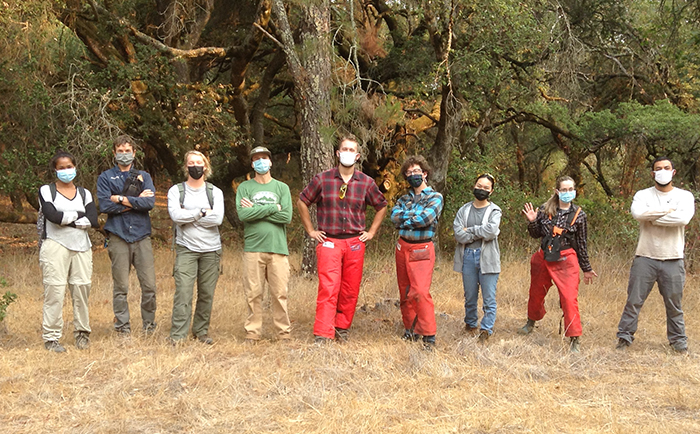 August 24, 2021, Santa Rosa, CA - The Sonoma County Board of Supervisors has awarded a $500,000 grant from PG&E Settlement Funds to Santa Rosa Junior College for a new Wildfire Resiliency workforce training program. This grant will fund up to three years of wildfire workforce training for students beginning this fall.
August 24, 2021, Santa Rosa, CA - The Sonoma County Board of Supervisors has awarded a $500,000 grant from PG&E Settlement Funds to Santa Rosa Junior College for a new Wildfire Resiliency workforce training program. This grant will fund up to three years of wildfire workforce training for students beginning this fall.
“SRJC is honored to partner with the County of Sonoma to train a local workforce to mitigate the risk of future catastrophic wildfires and ensure that the generational investment in wildfire resiliency creates and sustains family-supporting jobs in our community,” said SRJC Dean of Agriculture & Natural Resources, Benjamin Goldstein.
“Wildfire prevention, recovery, and resiliency is a top priority for Sonoma County, and we’re pleased to be able to support this critical workforce training program in partnership with SRJC,” said Sonoma County Supervisor Lynda Hopkins, Chair of the Board of Supervisors. “This is a forward-looking program that is timely, comprehensive, and community-based and will teach the essential skills that help protect and defend communities in Sonoma County and elsewhere for years to come.”
SRJC’s Wildfire Resiliency program will combine rigorous college coursework with hands-on training in a variety of wildfire resilience practices including prescribed grazing, forest fuel reduction, fire-resilient landscaping, defensible space, and post-fire mitigation and restoration. Students will hone their skills in work-based learning arrangements including paid internships at SRJC’s Shone Farm and through community partners conducting wildfire resilience work in high-need areas of the county.
Students in the Natural Resources program will receive fuel reduction training in Shone Farm's 120-acre forest, concentrating on thinning, burn piles, fuel breaks, restoration, and long-term treatment area monitoring. The Environmental Horticulture program focuses on defensible space and fire-safe practices for landscape design, construction, and maintenance within the first 100 feet of residential properties. The Adult Education program offers professional development in wildfire resilience and home hardening practices for those seeking to advance existing careers in landscape maintenance and landscape construction.
The Animal Science program teaches students about prescribed grazing to reduce fire risk and maintain post-burn areas and fuel breaks. “Prescribed grazing represents an immediate step towards increasing wildfire resilience in our community. Looking across past burn areas in Sonoma County, we observe that grazed areas have experienced less severe wildfire damage. We are excited to train students with the important knowledge of when and how to graze, while monitoring ecological conditions on the ground, and to develop a workforce in our community that can manage fire risk with grazing animals,” said SRJC Animal Science Faculty and Program Coordinator Amy Housman.
During its first year (Fall 2021-Fall 2022) the Wildfire Resiliency program will enroll 300 students. Enrollment from underrepresented student populations will be increased by 5 percent per year with partnerships with three community-based organizations for recruiting and enrolling underrepresented students. The program will develop and formalize partnerships for student internships, job placement, or technical assistance with three community organizations performing wildfire resilience work in the North Bay. Additionally, the program will provide work-based learning with 10 paid internships per academic year at Shone Farm as well as five stipends or college credits to students for internships with partner organizations doing wildfire resilience work in the community.
SRJC has already established a paid internship opportunity for students with Audubon Canyon Ranch’s Fire Forward program, the leading North Bay program building wildfire resilience through prescribed fire training and implementation. “Audubon Canyon Ranch is very pleased to partner with Santa Rosa Junior College over the next year to train and mentor future prescribed burn leaders,” said Interim Executive Director Nils Warnock.
For more information on the SRJC Wildfire Resiliency program, please email Benjamin Goldstein at bgoldstein@santarosa.edu.
____________________________________________________________________________________________________________________________________________________
SRJC was established in 1918 and has since provided quality education to more than 1.7 million students. SRJC is known for academic excellence, superb faculty and staff, comprehensive student services, and beautiful facilities. This treasured community institution is dedicated to removing barriers to students’ success and making higher education accessible to all.
For more information about ways to support Santa Rosa Junior College students, faculty, and programs, visit foundation.santarosa.edu or contact Executive Director J Mullineaux at 707-527-4797 or jmullineaux@santarosa.edu.




